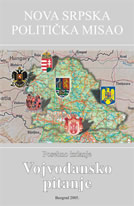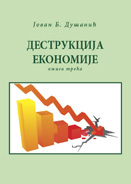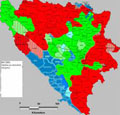| NSPM in English | |||
Bosnia's Uncertain Future |
 |
 |
 |
| субота, 25. септембар 2010. | |
|
Top ranking complexity The political system of Bosnia and Herzegovina is one of the most complex in the world. You should not be surprised by that – institutionalizing three nations, hostile towards each other, within the borders of one state, is a goal that belongs to the literary genre of political fiction. Nevertheless, European and Americans specialists managed to do it, an even a brief glance on the graphical scheme of the political system of the state impresses everyone. . zny Bośni i Hercegowiny jest jednym z najbardziej skomplikowanych na świecie. The order fixed in Dayton, finishing one of the bloodiest conflicts in the world’s history and creating one of the most experimental states in the world paradoxically remains the biggest problem of Bosnia nad Herzegovina. The ambitions and optimism of Western decision-makers painfully faced the over-dimensional specifics of the region. The level of the complexity of Bosnian political system is the main reason why the Bosnian political sysituation is paralyzed, which process is deepening in the recent years. Bad languages tell that the biggest success of the Dayton Accords was the ceasefire, but the political system created during the talks for Sarajevo, irrespectively of EU and US efforts, halted the development of the country. Of course, it is a big simplification, because irrespectively of interior animosities and misunderstandings, Bosnian authorities (true to tell, not without a big support from the West), managed to introduce a number of reforms. Thanks to it, Bosnia and Herzegovina two years ago, with plenty of difficulties, managed to sign an agreement of stabilization and association with European Union. This April Sarajevo was invited to participate in NATO Membership Action Plan, which is one of the main steps for the membership in the pact. The achieved reforms are only a drop in the ocean, and the main goal appears to be too difficult not only for Bosnian politicians, but also for European Union. When the state joined the Council of Europe, the member states of the EU began talks with Sarajevo, considering the constitutional changes, which are, according to the West, inevitable for the further democratization and development of the country. As it usually is during all kinds of reforms in Bosnia and Herzegovina, this question shook the Bosnian political scene. Lack of determination of the EU make the issue last for a number of years. Only in last October the member of Bosnian, EU, and US authorities decided to solve the problem. The October talks held in military base of Butmir (so-called Butmir process), that was coordinated by the Swedish ministry oforeign affair Carl Bildt (Sweden held a presidency in EU that year) and the deputy of the American Secretary of State, Jim Steinberg, ended without any results. The general sense of the political conflict in Bosnia and Herzegovina is limited to the question of the further presence of the international community in this country, as well as its influence on the country’s shape. Politicians from Serbian Republic (one of the two parts of the federation) are very unwilling towards the further interference of international representatives with the interior issues of Bosnia and Herzegovina. Its prime minister, Milorad Dodik, consistently persists in successive limiting the influence of Eudecision makers. Thus, all the political initiatives connected with the question of the role of international community in the state are blocked. The unwillingness towards all the initiatives is heightening the growing conflict between the authoities of Serbian Republic and the EU Special Representative in Bosnia and Herzegovina, which currently is Valentin Inzko. The omnipotence of UE representative angers Serbs, who perceive his broad authority as a threat to their own souvereignity. The conflict was deepened by Inzek’s decision, prolonging the mandate of international judges and prosecutors belonging to the High Council of Judges and Prosecutors of Bosnia and Herzegovina (this institution is handling the trial against the prime minister Dodik, which is about the bribery and fraud in the area of public funds). The EU decision prolonging Inzek’s mandate until August, 2011 has totally squandered any chances for any agreement with Serbs. The forthcoming election in Bosnia and Herzegovina are likely not to bring any improvement of the political situation in the country. In the situation of lack of any constitutional changes, the polictical structure after the election will be the same as it is now, maybe with some small personal differences. We should add that the ethnic makeup of the Bosnian state administration is fixed; this principle was created to prevent any ethnic group from taking the institution under full control. Many commentators presume that Milorad Dodik’s position will remain strong – his opponents can not mach him. Council of Europe in one of its documents also expressed its concern about the risk of further stagnation of the state. Considering the facts mentioned, the fear that Bosnia and Herzegovina will remain Europe’s black hole for years appear to be absolutely justified. The yo-yo effect The main attention of both world media and European Union is now focused on solving the Kosovo problem. However, the question of the KosovoAlbanians’ independence efficently heats up the atmosphere in Bosnia and Herzegovina. European Union keeps up to its Euro-optimistic scenario, expressing its will to include the post-Yugoslavian states into its structures as fast as possible. Brussels is deeply convinced thet the enthusiasm about the prospect of becoming the EU member is the most efficient tool of „europeization” of the stubborn Balkan people. Some people call Bosnia and Herzegovina “mini-Yugoslavia”, and it makes sense, because it is now a quintessence of all the negative factors typical for the federative states. The October elections are likely to make the Bosnian question a matter of the international concern. However, the prospects of solving the Bosnian puzzle appear very vague. Mediation of European Union and United States of America is currently not enough to cool down the Balkan melting pot. The rise of the role of the other powers, that have their significant interests in the region, may be the chance for the improvement of the situation. This thesis was confirmed by the last visit of Turkish prime minister Gül to Sarajevo. During his visit, Gül expressed his will for the Turkey to participate in the process of solving the political deadlock in Bosnia. Turkey, which wants to be perceived in the world as a fficient mediator, has already organized the meetings of Bosnian, Serbian, and Croatian politicians that were meant to lower the level of tensions between the Balkan ethnic groups and promote an effective cooperation among them. Having in mind that Ankara has a positive attitude towards the EU scenario of the development of the region, the chance should not be wasted. However, the European Union, which cares too much for its own prestige, seems not to notice those opportunities. The participation of Russia, that would be warmly welcomed by the Bosnian Serbs, may be a balancing factor in the process. This course of action would be in accord with the new strategy of Kremlin’s policy, seeking for the possibilities of improvement of its position in international relations. Attitude of local powers is another question. While Croatia appears to be fully susceptible tu Brussel’s suggestions, the relations between EU and Serbia may tip the balance. While the government in Belgrade permanently ensures everyone about its respect towards the territorial integrityof Bosnia and Herzegovina, the Kosovo question may deeply change Serbian attitude towards the possible secession of the Serbian Republic. In this context, one should remember about the precedent of the recent announcement of the International Court of Justice considering Kosovo. Black Clouds It seems that again the Bosnian sky is full of the dense black clouds, that cannot be dispersed by the forthcoming election. Undoubtedly, the attitude of Serbian Republic’s authorities,which openly expressed their discontentment about their presence inside the Bosnian federation, is the biggest problem. On the other hand, the possible secession of Banja Luka will not be welcomed by both international community and neighbour countries (Serbia and Croatia), what lowers the risk of this scenario to come true. It seems that the Bosnian deadlock is not likely to be solved. The only possibility is convincing Bosnian Serbs, that the functioning of their state as a part of Bosnian federation has a sense. However, the activities of the West in the region convince many that the independence may be a better solution. We should hope that the decision of Election Committee of Bosnia and Herzegovina will force the local politicians to craete the constructive strategies of improving the political situation in the country. Considering the low level of willingness to take any risk of the local elites, having its roots in supervisory and coordinating role of the international community, those hopes may end in vain. In the case of Bosnia and Herzegovina, the decisive and innovational actions are needed. However, every action is risky. Nevertheless, those steps should be taken. Different solutions should be taken under consideration, including the division of “the Dayton creation”. The current „caress strategy” is undoubtedly a grand failure. Łukasz Reszczyński – Expert of theEuropean Centre for Geopolitical Analyses (www.geopolityka.org) and of the Committee of Analyses of the Amicus Europae Fund. Article was originally published in issue 37 (559) polish weekly “Przegląd” |
Остали чланци у рубрици
- Playing With Fire in Ukraine
- Kosovo as a res extra commercium and the alchemy of colonization
- The Balkans XX years after NATO aggression: the case of the Republic of Srpska – past, present and future
- Из архиве - Remarks Before the Foreign Affairs Committee of the European Parliament
- Dysfunction in the Balkans - Can the Post-Yugoslav Settlement Survive?
- Serbia’s latest would-be savior is a modernizer, a strongman - or both
- Why the Ukraine Crisis Is the West’s Fault
- The Ghosts of World War I Circle over Ukraine
- Nato's action plan in Ukraine is right out of Dr Strangelove
- Why Yanukovych Said No to Europe

.jpg)








 The forthcoming elections in Bosnia and Herzegovina, which are due to take place on October, 3rd, are a key political event in a region. Political leaders’ declaratons and promises of well-being for the people will sound again everywhere within the borders of this country, which is politically paralyzed in a larger and larger extent. What is interesting is that simultaneously a chance to „refresh” a musty Bosnian political scene. The October elections are going to consist of three parts: the three-person presidium election, parliamentary election of the federation, and elections of both subjects of the federation of Bosnia and Herzegovina.
The forthcoming elections in Bosnia and Herzegovina, which are due to take place on October, 3rd, are a key political event in a region. Political leaders’ declaratons and promises of well-being for the people will sound again everywhere within the borders of this country, which is politically paralyzed in a larger and larger extent. What is interesting is that simultaneously a chance to „refresh” a musty Bosnian political scene. The October elections are going to consist of three parts: the three-person presidium election, parliamentary election of the federation, and elections of both subjects of the federation of Bosnia and Herzegovina.












